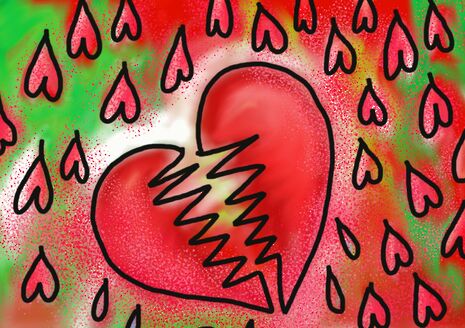Surviving love and loss
Healing from heartbreak is hard enough without the intensity of Cambridge terms. But Sofia Weiss argues that it can be done

A broken heart is an unspoken trauma to the mind, body and spirit and, given that university is often synonymous with first loves and losses, one that most of us will endure.
Yet unfortunately, the mania of term shows little mercy to the bereaved. There are no ‘sick days’ valid for ailing hearts. Instead, we are expected to show up and perform at ‘normal ability’. This is no mean feat, particularly for those of us with especially marshmallow hearts.
However, there are ways to manage, underpinned largely by the fact that there is no set time frame for when one should feel or not feel a certain way, to hold on to or let go of what is lost. What is important is to not neglect personal self-love, self-care and self-help amid extreme emotional fragility.
In the first instance, this means not suppressing your feelings. Ultimately, the only way to truly survive heartbreak, whether it happened in the past or in the present, is acknowledging that it hurts – that something inside of us is causing pain connected to this specific loss, extending far beyond our own comfort level. Luckily we can choose to reflect upon it, to allow the suffering to come to the surface and feel the emotions it stirs, without judging ourselves. This includes learning to accept who is no longer a part of our lives and finding gratitude that, because of them, we have been brought to where we are today – even if it’s not cognitively the state in which we’d currently prefer to be. Indeed, the beauty of life is that it does shift, grow and evolve. Hence, there is light anew to be found in the richness of the Cambridge experience, beyond crying perpetually into cheap wine.
The indispensable healing mechanism we have at our disposal, perhaps, is the social circle in which we lie. In fact, in losing one person from our lives, there is a golden opportunity to nurture our interactions with others and derive new meaning and fulfilment from relationships. Friends prove perpetually willing to stop the natural, if unhelpful, tendency to speak only of an ex, to provide copious volumes of ice cream and alcohol, no matter how many times you deplete their tissues with tears or burn their ears with your memories. They want to help. Do not be afraid to call on them.
Vital, too, is to stop the self-perpetuating torture of perceived guilt. It is far too easy to replay every moment and unpack all the ways in which you were painfully selfish or ungrateful, and be consumed by the haunting ‘what if’. But in the end, every relationship consists of two parties, neither of whom were perfect, and so incessant self-berating proves futile. Mastering the skill of apportioning responsibility is not easy, and will require a regulation of thoughts on a daily basis. Yet practice truly does makes perfect. And if you do wish to put yourself under the microscope for examination, it should be a peaceful experience: decide to improve for yourself, not for your ex.
The greatest difficulty arises, perhaps, in that Cambridge seems to shrink indefinitely post-heartbreak, and you can find yourself seemingly running into the very object of your torment at every opportunity. In this scenario, the perennial adage of ‘holding one’s head up high’ proves the best solution. Even if you feel winded every time you cross their path (which in my experience, you will, sorry), you should seek to know your self-worth, to treasure it and hence outwardly emanate the confidence you deserve to feel. For you are truly wonderful and the end of a relationship does not in any manner call that into question.
If all else fails, there is comfort to be sought in the catharsis of words. It is no coincidence that literary giants have throughout time concerned themselves with articulating that which is felt so brutally, so rawly, within during heartbreak. To my mind, Pablo Neruda has best achieved the quest. There is much solace to be found in the line: “you can cut all the flowers, but you cannot keep Spring from coming”.
Heartbreak will yield to contentment – even in the unforgiving milieu of Cambridge. Until then, we must accept the pain, learn to manage it and find ways to let go of whatever guilt we may have. That’s when we truly begin to survive – and beyond surviving, when we pave the path to truly begin to wholly live again
 News / Cambridge academics stand out in King’s 2026 Honours List2 January 2026
News / Cambridge academics stand out in King’s 2026 Honours List2 January 2026 Interviews / You don’t need to peak at Cambridge, says Robin Harding31 December 2025
Interviews / You don’t need to peak at Cambridge, says Robin Harding31 December 2025 Comment / What happened to men at Cambridge?31 December 2025
Comment / What happened to men at Cambridge?31 December 2025 News / Varsity’s biggest stories of 202531 December 2025
News / Varsity’s biggest stories of 202531 December 2025 Features / “It’s a momentary expression of rage”: reforming democracy from Cambridge4 January 2026
Features / “It’s a momentary expression of rage”: reforming democracy from Cambridge4 January 2026









